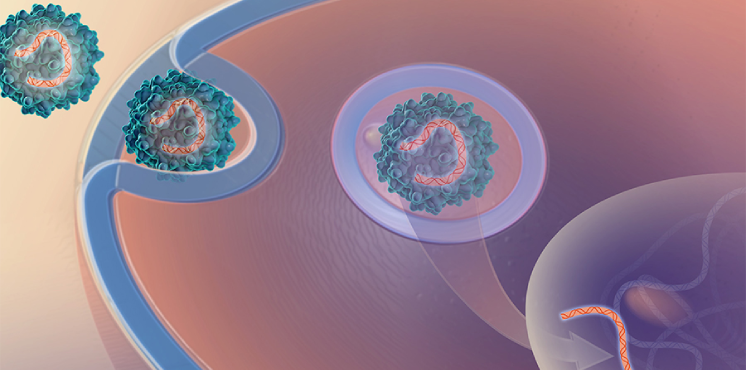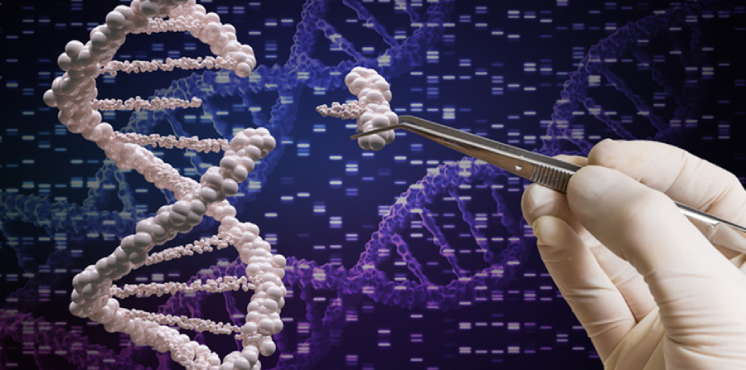Bespoke Gene Therapy Consortium (BGTC)
BGTC is part of the Accelerating Medicines Partnership® (AMP®) program, a public–private partnership among NIH, the U.S. Food and Drug Administration (FDA), multiple pharmaceutical and life sciences companies, and nonprofit and other organizations.
Contact
About AMP and BGTC
The AMP program, which is managed by the Foundation for the NIH (FNIH), aims to improve current models for developing diagnostics and therapies. The BGTC is establishing platforms and standards to speed the development and delivery of customized or “bespoke” gene therapies that could treat millions of people affected by rare diseases, including diseases too rare to be of commercial interest.
Rare Diseases and the Promise of Gene Therapy
About 10,000 known diseases are considered “rare,” meaning they affect fewer than 200,000 people in the United States. Collectively, rare diseases are hardly rare; millions of people in the United States have rare diseases that diminish their quality of life and threaten their health. Moreover, they have significantly higher medical expenses, as medical care costs three to five times more for individuals with rare diseases than for individuals without rare diseases.
The BGTC is the first AMP initiative focused on rare diseases and the sixth AMP initiative overall. It also is the first to focus on a therapeutic platform.
Fewer than 10% of rare diseases have FDA-approved treatments. About 80% of rare diseases are caused by known alterations in a single gene. This common feature makes these diseases potential candidates for gene therapy, which entails replacing or correcting a defective gene. However, creating gene therapies for rare diseases is complex, time consuming and expensive. The gene therapy development process is hampered by a lack of access to proprietary tools and methods, a lack of standards, and a one-disease-at-a-time approach. To date, there are six adeno-associated virus (AAV) gene therapies approved by the US FDA.
The Bespoke Gene Therapy Consortium
Launched in October 2021, the BGTC will create gene therapy resources that the research community can use to streamline gene therapy development for rare disorders, making the process more efficient and less costly.
One of the BGTC’s goals is to improve the understanding of the basic biology of the harmless adeno‑associated virus (AAV), a common gene-delivery vehicle or vector. BGTC scientists will learn more about how AAVs carry genes to the correct place in cells, how those genes get into cells, and how the newly transported genes are turned on in the target cells. This information will help improve the effectiveness of AAV gene therapies.
Another BGTC goal is to improve the efficiency of both vector manufacturing and production quality control testing. To this end, the BGTC will develop a standard and broadly applicable set of analytic tests that can be used to manufacture viral vectors.
The BGTC clinical component aims to streamline the path from animal studies to human testing. Funded researchers will conduct eight clinical trials, with each trial focused on a different rare disease. None of the chosen diseases have an existing gene therapy or one in development, but the diseases that have been chosen are well understood, and the funded scientists have considerable experience studying each disease. In addition, the trials will use different AAV vectors from other trials. During the BGTC clinical trials, scientists will develop strategies for streamlining the regulatory processes for FDA approval of safe and effective gene therapies, and they will develop standardized approaches to preclinical testing (e.g., toxicology studies).
Our Role
We are partnering with the FDA and FNIH, 10 NIH Institutes and Centers (ICs), and several pharmaceutical companies and nonprofit organizations to form the BGTC. The lead NIH IC for BGTC, we expect to contribute approximately $8 million of a total $39.5 million provided by participating NIH ICs. Together, NIH and private partners will contribute approximately $104 million over 5 years to support BGTC-funded projects.
Our mission is to re-engineer the translational research process so new treatments and cures for diseases can reach patients faster. Notably, we focus on the critical and unmet needs of people with rare diseases. The BGTC is one of several NCATS-led programs that apply the “many-diseases-at-a-time” approach to gene therapy development for rare diseases, including the Platform Vector Gene Therapy (PaVe-GT) pilot project. Both the PaVe-GT pilot project, which was launched in February 2019, and the BGTC work to improve the efficiency and accessibility of gene therapy development and delivery for rare diseases. These two efforts serve different but complementary goals, with the PaVe-GT pilot project using AAV vectors to develop gene therapies for four rare genetic diseases that differ from the four to six clinical studies that will be supported by the BGTC.
Our intramural laboratories will play an important role in the BGTC’s basic biology component. With expertise in preclinical drug development — including assay development, high-throughput screening, disease modeling, toxicity testing and more — NCATS researchers are poised to create data that could lead to improved vector production and therapeutic gene activity.
BGTC News

New Path for a Gene Therapy Trial at NIH for a Rare Metabolic Disease
November 19, 2024 - NCATS News
- Bespoke Gene Therapy Consortium (BGTC)
- Our Impact on Clinical Trials
- Our Impact on Drug Discovery and Development
- Our Impact on Rare Diseases
- Platform Vector Gene Therapy (PaVe-GT)
Scientists at NCATS and other NIH institutes and centers are teaming up to advance a gene therapy treatment for MMA, a rare and potentially life-threatening genetic disorder.
Read ArticleNew Path for a Gene Therapy Trial at NIH for a Rare Metabolic Disease
November 19, 2024 - NCATS News
- Bespoke Gene Therapy Consortium (BGTC)
- Our Impact on Clinical Trials
- Our Impact on Drug Discovery and Development
- Our Impact on Rare Diseases
- Platform Vector Gene Therapy (PaVe-GT)
Scientists at NCATS and other NIH institutes and centers are teaming up to advance a gene therapy treatment for MMA, a rare and potentially life-threatening genetic disorder.
New FDA Designations May Jumpstart Gene Therapy Development
October 18, 2024 - NCATS News
- Bespoke Gene Therapy Consortium (BGTC)
- Platform Vector Gene Therapy (PaVe-GT)
New FDA designations granted to NCATS for rare disease therapies provide financial incentives for companies to further develop treatments.
Automation and Standardization Will Cut Cell and Gene Therapy Production Costs
August 21, 2024 - Media Coverage
- Bespoke Gene Therapy Consortium (BGTC)
- Platform Vector Gene Therapy (PaVe-GT)
BGTC Current Happenings
- The Foundation for the National Institutes of Health Announces Selection of Eight Rare Diseases for the Bespoke Gene Therapy Consortium Clinical Trial Portfolio
May 16, 2023 - A new research effort takes aim at 8 rare diseases. It could revolutionize many more.
May 24, 2023 - CHOP Researchers Selected for Bespoke Gene Therapy Consortium
May 24, 2023 - Public-Private Alliance Chooses Eight Rare Diseases for Focused Gene Therapy Development
June 19, 2023 - Public-Private Consortium will Fund Three Gene Therapy Clinical Trials at UT Southwestern and Children’s Health
June 27, 2023 - Rare Diseases Selected to Develop Gene Therapies
July 5, 2023 - The Foundation for the National Institutes of Health Announces Publication of Regulatory Playbook to Advance AAV Gene Therapies for Rare Diseases
February 6, 2024
BGTC Publications
- The Bespoke Gene Therapy Consortium: facilitating development of AAV gene therapies for rare diseases
February 6, 2024 — Nature Reviews Drug Discovery - BGTC Regulatory Playbook Version 1.0
February 6, 2024 — AMP® Bespoke Gene Therapy Consortium
Related Research

Platform Vector Gene Therapy Project
Our pilot project is testing the feasibility of increasing the efficiency of gene therapy clinical trial startups by using the same gene delivery system and manufacturing methods for multiple gene therapies.

Somatic Cell Genome Editing
We help lead this NIH Common Fund program that aims to create and make available high-quality tools for safe and effective genome editing in people.

Rare Diseases Clinical Research Network (RDCRN)
We oversee this NIH-wide grant program that supports medical research on over 200 rare diseases through clinical studies, including collaborations, study enrollment and data sharing.


